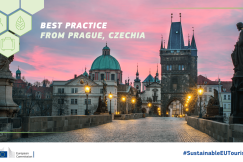Best practices
31 July 2025
Sustainable EU Tourism project - best practice: Gothenburg
Best practices
31 July 2025
Coastal, maritime and inland water tourism
Cultural tourism
MICE tourism
+6 more
Login / create an account to be able to react

Gothenburg, Sweden, embarked on a transformation toward sustainable tourism development in response to growing demand, particularly within the MICE sector. By consistently implementing comprehensive sustainability standards, certifications, and support programs across meetings, hotels, and other sectors, the city successfully positioned itself as a clear and strong brand for sustainable tourism
Sustainable EU Tourism project
Topics
Sweden
Destination Management & Marketing Organisations
-
Specific types of tourism
-
-
Coastal, maritime and inland water tourism
-
Cultural tourism
-
MICE tourism
-
Urban/city tourism
-
-
Transition Pathway Strategic Areas
-
-
Best practices, peer learning and networking
-
Changes in tourism demand and opportunities
-
Governance of tourism destinations
-
Green Transition of Tourism Companies and SMEs
-
-
Business activities
-
-
Other
-
Share
Gothenburg, Sweden, has been recognised as a best practice by the Sustainable EU Tourism project for establishing itself as a leading sustainable tourism destination through coordinated stakeholder engagement, smart tools, and long-term planning.
Since 2009, in preparation for its 400th anniversary, the city launched a collaborative process involving citizens and tourism stakeholders to promote sustainability. Led by the DMO and MICE sector, Gothenburg introduced free training, expert guidance, and incentives to help hotels, event organisers, and attractions obtain sustainability certifications.
To support informed decision-making, the city implemented digital tools such as the Event Impact Calculator and the Climate Smart Vacation Calculator, while monitoring progress through the Global Destination Sustainability Index, where Gothenburg has ranked first multiple times. These efforts have led to nearly all hotels and meeting venues being certified, stronger tourism revenues, and improved local offerings.
Gothenburg’s success highlights the importance of clear sustainable branding, strong stakeholder collaboration, and data-driven tools to boost tourism, enrich local offerings, and build a positive reputation.
For more details on the key challenges and solutions, please refer to the attached document.
Documents
Comments (0)
See also
-
16
Sustainable EU Tourism - Key challenges and best practices
- Categories
- Coastal, maritime and inland water tourism Cultural tourism Ecotourism +64 more
-
29
EXPERIENCE: Completed initiative for boosting off-season tourism
- Categories
- Coastal, maritime and inland water tourism Cultural tourism Ecotourism +38 more
-
14
Sustainable EU Tourism project - best practice: Prague
- Categories
- MICE tourism Urban/city tourism Best practices, peer learning and networking +9 more



